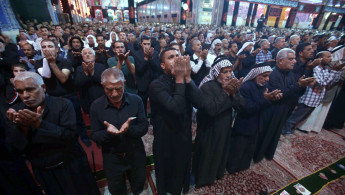Saudi newspaper sacks Iraq correspondent over fabricated WHO report
The Saudi-owned newspaper Asharq al-Awsat said on Monday it fired its Baghdad correspondent, a day after printing controversial accusations wrongly attributed to a UN spokesperson.
The report drew condemnation from Iraqi Prime Minister Haider al-Abadi and several other leading Shia figures and bodies demanding an apology.
The sacking of the journalist, who was not named, came after the paper ran an article on Sunday accusing Iranian pilgrims taking part in the Shia Muslim commemoration of Arbaeen of sexually harassing women.
The article quoted a World Health Organisation spokesperson as saying that after last year's pilgrimage more than 169 Iraqi women became pregnant out of wedlock.
The UN's health agency said the "claim that this information was released by a WHO headquarters communications officer is completely erroneous".
The London-based daily paper published the WHO statement on Monday in what it said was evidence of "its commitment towards the truth... and to correct the erroneous information contained in (Sunday's) report".
"We also announce that we have stopped cooperating with the newspaper's correspondent in Baghdad responsible for the report because he did not respect professional and ethical norms," it said.
Meanwhile, Asharq al-Awsat correspondent in Iraq Hamza Mustafa said he was resigning from the paper, although he stressed he did not write the article.
"I announce my resignation... after having asked them to identify the correspondent responsible for the false report," Mustafa said on his Facebook page.
 |
We also announce that we have stopped cooperating with the newspaper's correspondent in Baghdad responsible for the report because he did not respect professional and ethical norms. - Asharq al-Awsat |
 |
Another journalist working for the newspaper in Baghdad, Maad Fayyad, in a statement obtained by AFP, said he had nothing to do with the controversial article.
"I am innocent... and those who know me... know it would be impossible for me to resort to such things," said Fayyad.
Arbaeen, one of world's largest religious events, commemorates the death in 680 of Imam Hussein, the grandson of the Prophet Mohammed.
Millions of Shias from around the world take part each year in the massive processions to the shrine city of Karbala.
This year's edition culminated on Monday, with officials expecting the number of visitors to total 17 to 20 million, including around three million Iranians.





 Follow the Middle East's top stories in English at The New Arab on Google News
Follow the Middle East's top stories in English at The New Arab on Google News
![The UAE is widely suspected of arming the RSF militia [Getty]](/sites/default/files/styles/image_330x185/public/2024-11/GettyImages-472529908.jpg?h=69f2b9d0&itok=Yauw3YTG)
![Netanyahu furiously denounced the ICC [Getty]](/sites/default/files/styles/image_330x185/public/2024-11/GettyImages-2169352575.jpg?h=199d8c1f&itok=-vRiruf5)
![Both Hamas and the Palestinian Authority welcomed the ICC arrest warrants [Getty]](/sites/default/files/styles/image_330x185/public/2024-11/GettyImages-2178351173.jpg?h=199d8c1f&itok=TV858iVg)